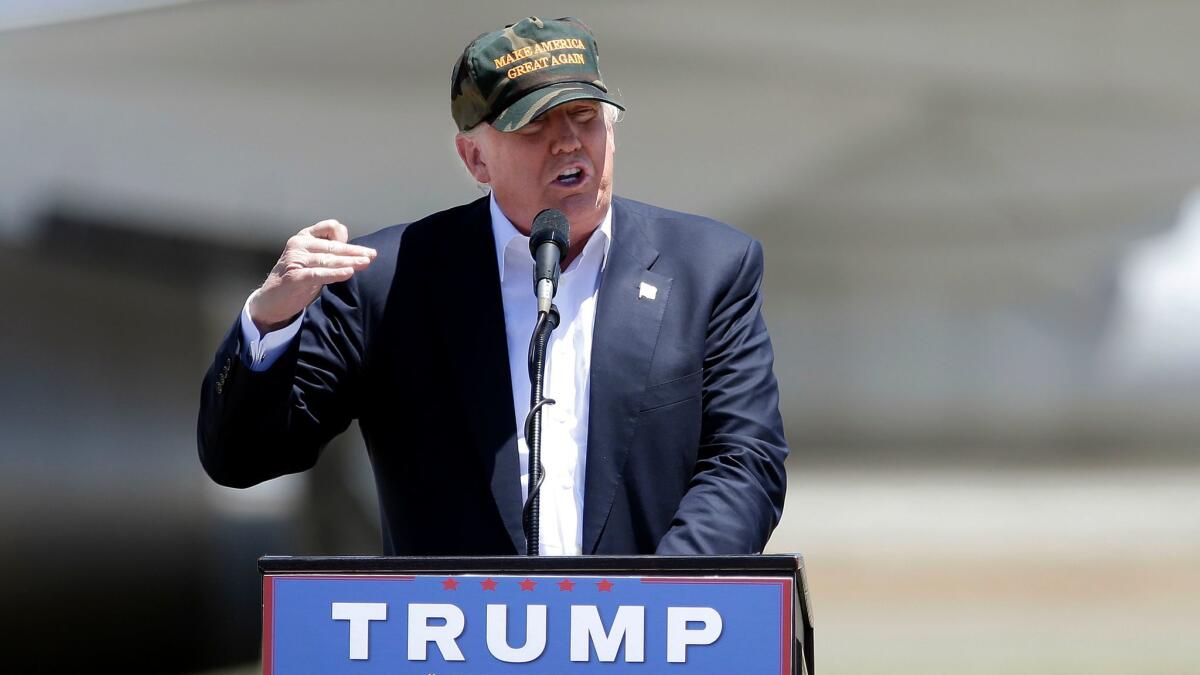Op-Ed: Notes from an angry black voter

From the beginning of the 2016 presidential campaign, pundits puzzled over why Donald Trump garnered so much support. Now they’re puzzling over why a majority of the country picked him despite increasingly unsavory revelations about his business dealings, his behavior toward women and his open contempt for anyone who opposes him, even mildly.
Trump mostly appeals to older white, male, working-class voters, although we now have to acknowledge that his white support cuts across many lines. Trumpism isn’t limited to Southerners in pickup trucks sporting Confederate flags. Middle-class and educated white people in Massachusetts, New Hampshire, Indiana and Arizona are with Trump too.
As the polls tightened in the final days of the campaign, Trump’s support reflected Republican tribalism — the party, or what’s left of it, “coming home.” But it also reflected a big surge in white tribalism.
Why wasn’t anyone in this election cycle obsessively asking black people what they think of our embattled democracy?
What bothers me is that all along the media treated this brand of tribalism with respect rather than the derision it deserves. Reporters and commentators couldn’t bring themselves to call the Trump phenomenon what it is: a very public expression of what many white Americans privately sanction — massive entitlement and emotional, race-based beliefs about who should be calling the shots in the United States.
It isn’t just Trump and his most-dedicated followers who expect to see themselves on top. Many others who don’t support Trumpism in all its details are still willing to tolerate a certain amount of intolerance. It doesn’t raise their hackles; they may even see it as necessary to some degree. For them, Trump’s crudest remarks are unfortunate, perhaps, but obviously not a deal breaker.
Such indifference is one effect of privilege, privilege that extends to the mainstream media. Despite being constantly accused of liberal bias, the mainstream media have been falling all over themselves writing and broadcasting sympathetic stories about Trump supporters, who have been mostly painted as victims of a vicious economy and an elitist government that left them out in the cold.
These profiles have carefully parsed what’s going on with these folks — who are they, what makes them tick? Why are such essentially good people so bitter? Thomas Frank’s famous question from the George W. Bush years, “What’s the matter with Kansas?” has expanded into “What’s the matter with America?” And the approach to answering it has been to give Trump voters the benefit of the doubt.
But since we’re on the subject of ascertaining what’s wrong with America, what about me? Why wasn’t anyone in this election cycle obsessively asking black people what they think of our embattled democracy? Why not delve into how we feel about being targeted yet again, caught up in racial ugliness Trump himself seeded in the birther movement against Obama eight years ago?
Why haven’t there been big takeouts about embittered African Americans facing a gravely uncertain economic future? Why not ask us how we felt watching the chief provision of the Voting Rights Act — acknowledged as crucial by every president since Lyndon Johnson — unceremoniously gutted by the Supreme Court? Why hasn’t anybody been examining black anxiety in the age of Trump?
The lack of media interest in these questions is not just frustrating but racist. The black point of view and its place in the campaign’s national conversation was occasionally recognized, but it wasn’t examined in any depth. Although the fortunes of black people are always a telling indicator of the health of the American project, the intimate question of what makes us tick — or explode — was not deemed particularly newsworthy in months (and months) of election coverage.
So in case anybody’s listening, I’m officially angry.
Being black in America is never not complicated, and the choices we faced in this election highlighted those complications as never before. We had to deal with the open racism of Trump, which flirts with white nationalism and traffics in the worst kinds of stereotypes. And we also had to reckon with the Democrats’ cumulative indifference, and sometimes its hostility, to issues we see as explicitly racial.
Even sympathetic white liberals and progressives tended to flatten us out, erase us, by reflexively equating our struggles with those of immigrants, for example. Leave it to the bilious Trump to accidentally have a point when he advised us to vote for him because, given the persistence of our crises under both parties, what did we really have to lose in voting for a man who’s essentially a party of one?
Of course Trumpism is no answer. The Trump presidency will exacerbate our problems; with him in office we have everything to lose.
And yet Trump is hardly the only white person who reduces black reality to the simplest of terms for political, personal or professional expediency. Memo to the media and the nation: Black reality is singular. It matters. And never more than in an extraordinary election — and with, regrettably, an electorate — that was fueled by white rage.
Erin Aubry Kaplan is a contributing writer to Opinion. Her latest book is “I Heart Obama.”
Follow the Opinion section on Twitter @latimesopinion or Facebook
More to Read
A cure for the common opinion
Get thought-provoking perspectives with our weekly newsletter.
You may occasionally receive promotional content from the Los Angeles Times.










